
Graduation ceremonies and Commencement would have been this weekend. Ever since Penn first announced there would be no in-person ceremonies this year, I have been thinking about what graduation means as a first-generation, low-income student, and what it means for my family.
While it is important to not have an in-person commencement and put family and friends at risk, it also does not minimize the emotions students have experienced from the time we had to leave campus. On Wednesday, President Gutmann announced our rescheduled commencement celebration for May 22-23, 2021. In the grand scheme of things during a health crisis, a postponed commencement is far from the worst result. But we also have to allow ourselves to not minimize the comparatively smaller impacts of the coronavirus, because that is not healthy either. If anything, this pandemic has further made me realize the importance of this milestone, and what it means beyond me. So, here is some of what graduation means for FGLI students, and how the pandemic has complicated it.
Going to Penn was a chance to help uplift our families out of poverty, to pave a new path for our lives and future generations, to give us the skills to help advocate for the communities we come from. It was to show our immigrant parents that their sacrifices were worth it, to show our younger relatives that they too can go to and graduate from college, to fulfill our potential to those teachers and friends that helped us get to Penn.
Penn was not easy, academically nor emotionally. Sometimes, we were supporting our families at home while simultaneously taking classes, working multiple jobs, and pursuing extracurriculars. Other times, we felt guilty for dealing with our own struggles and not being able to help out our families.
Graduation was when we would get to sit in Franklin Stadium in our regalia surrounded by our peers, to walk across a stage, to take photos with family at the very institutions and systems that had been inaccessible to them. Due to language barriers, or the lack of a shared experience, this was our chance to make up for all the times we were not able to talk to our families about what the college experience consists of. Our chance to show them the buildings we learned in, the cultural resource centers we called home, the spaces we had club meetings and performances, and the people with whom we have spent the last few years. This was our chance to immerse them in an experience they were not able to have.
For some students, graduation was the one time our families were willing to save and spend the money to travel to celebrate our successes. For some, it was a chance for family to stay in Philadelphia longer than the hour they spend dropping us off for the semester, before they went back to work. For others, family members were not going to make it, but surrounding ourselves with our fellow FGLI peers was just as important to celebrate what we have worked towards.
Maybe I am guilty of tying too much meaning to symbolic events, but Commencement meant something more than graduating from Penn. While everyone’s graduation ceremony means something, it had a special, symbolic importance to us. It meant creating intergenerational change for our families, friends, and communities. I am lucky to have submatriculated into Penn's Master of Public Health program, and will gratefully get to experience a Penn graduation again, but for some, this would have been the only chance, and they may not be able to return to Philadelphia next year. So, next May, for those who are able to come back to attend, not only will we celebrate then, but I say we plan a FGLI-specific ceremony for us to come together, something future FGLI graduates can continue.
All that being said, as much as we want an in-person ceremony, we will not let it define our achievements — the classes we passed and those that we did not, the friends we have made and the ones we have lost, the clubs we grew in and the ones we dropped. Some have found their voice and calling, while others are still figuring it out. Some have post-graduate plans, while others are entering an uncertain future. FGLI students are far from identical, but what we have in common right now is that we showed everyone we had what it takes, and we have successfully navigated both the resources of Penn, and the inequitable and inaccessible parts of Penn.
I have seen the FGLI community grow over the last four years. We are strong. We have refused to be defined by statistics. We have proven people wrong. We did this. We really did this.
LOUIS LIN is a College senior from Long Island, New York studying Health and Societies and Political Science. His email address is louislin@sas.upenn.edu.
The Daily Pennsylvanian is an independent, student-run newspaper. Please consider making a donation to support the coverage that shapes the University. Your generosity ensures a future of strong journalism at Penn.
Donate







